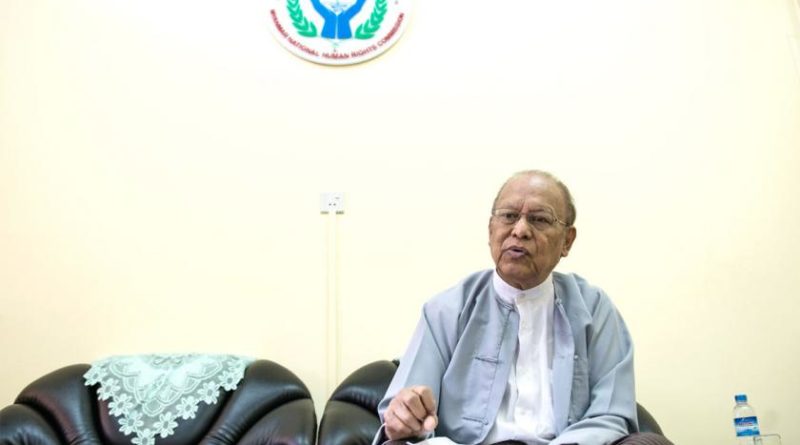RANGON- Activists seek review of rights commission
Local and foreign rights activists are calling for a review of the Myanmar National Human Rights Commission (MNHRC) as the five-year mandate of the commissioners expired on September 23.
.
President U Win Myint has yet to decide whether to reinstate the commission.

Sean Bain, legal adviser of the International Commission of Jurists (ICJ), sought prompt reform of the commission that would make it independent in performing its functions.
“The National League for Democracy-led government should promptly reform the MNHRC Law to enable the selection of better qualified and representative commissioners and grant them the independence and resources necessary for their work,” he said in a statement.

In a statement issued on Tuesday, the ICJ listed four recommendations for the government to make the commission more effective in protecting human rights in Myanmar.
They include appointing commissioners to appropriately reflect the diversity of the Myanmar population. It called on the government to adopt a broad and active interpretation of the commission’s mandate.
The ICJ seeks to include provisions in the MNHRC Law that strengthen the agency’s capacity and independence.
It also wants guarantees in the law of the structural and financial independence of the MNHRC in amending the 2008 Constitution.
“The commissioners should robustly pursue their mandate, including by advocating for the rights of society’s most vulnerable people,” Bain said.

Commission’s five year report card
Formed under the administration of former president U Thein Sein, the commission has 11 members.
Its general duty is “to safeguard the fundamental rights of citizens enshrined in the Constitution of Myanmar.” The Pyidaungsu Hluttaw (Assembly of the Union) upgraded the agency into a permanent body by enacting the MNHRC law in 2014.
The law stipulates that the commission is a national-level organisation established to protect the fundamental rights of social communities from being violated or treated arbitrarily by anyone, including the government.
The steady rise in the number of complaints submitted to the commission each year indicated an increase in human rights violations in the country.
In 2016, there were 611 complaints, but a year later, the number of complaints rose to 1125. Last year, there were 3281 complaints.
From January to April this year, 109 land disputes, 48 legal cases and 40 cases related to the police were filed with the commission.
Local human rights activists said that many complaints filed with the commission remain unresolved.

Some complaints misfiled
“There were complaints of land seizures by the two previous governments. It is true that these were human rights violations, but we can’t hold the present government accountable because it was not in office at the time,” said U Yu Lwin Aung, a commission member.
“Some people complain about marriage or family inheritance problems. There were some complainants who were wrong,” he added, noting that of the complaints filed last year, more than 1000 were unrelated to human rights.
But Daw May Sabei Phyu, director of the Kachin Peace Network, a local non-governmental organisation, said that some valid cases have never been resolved.
She cited cases submitted by the network about the slaying of two female Kachin school teachers, and a father who was killed by an artillery shell in Hpakant in Kachin State. There was also a soldier’s attempted rape of a 73-year-old woman in Moe Mauk village.
“We complained with the expectation that these cases would be resolved,” she said. “But the commission did not give any answers.”
Farm activists also said that complaints of land disputes filed with the commission remained unsettled.
“When farmers complained about what they suffered, the commission told them to negotiate with the township land committee. So how does it make a difference?” said Ma Su Su Nway, chair of the Myanmar Farmers Union.
U Yu Lwin Aung, said that of the more than 3200 complaints filed last year, the commission resolved more than 800.
One case that really hurt the commission’s image was the case filed against the owners of the Ava Tailor Shop in Yangon in 2016. The complaint accused them of detaining and torturing workers, and forcing them to work unreasonably long hours for no extra pay.
The commission negotiated with the victims to drop the case in exchange for a K5 million (US$3300) payment from the owners. Four members of commission had to resign due to public outrage following the settlement.
The ICJ underscored the need to replace the commission’s members, because some of them are not experts on human rights, they all are over 60 years old, and they don’t represent Myanmar’s diverse population, it said.
Twenty-four local civic and non-governmental organisations said there needs to be more transparency in the selection of commission members, because the team selecting the commissioners did not publicise the list of candidates but only announced the names of those appointed by the president.
The activists said the military should not be on the team that selects the commissioners since it is sometimes the subject of human rights complaints.
“The team should not have members who commit or condone human rights violations,” said Daw May Sabei Phyu.
The activist groups were concerned that government officials and military officers would be elected behind closed doors in the next selection round.

What do we change?
The activists want to remove a provision in the MNHRC Law that requires commissioners to be at least 35, since this excludes 60 percent of the population.
The ICJ seeks to upgrade the commission from its ordinary legal status formed under a normal law to a status guaranteed under the Constitution. If it is stipulated under the Constitution, a human rights organisation would become permanent, it said.
“A constitutional provision, in contrast to ordinary legislation, is subject to a stricter amendment process that would less likely render the MNHRC politically vulnerable,” said Jenny Domino, ICJ associate legal adviser.
U Yu Lwin Aung said the commissioners back the proposed amendments and sent a letter to that effect to the president in June. He said the commissioners proposed six amendments after consulting with and taking suggestions from civil society, international experts and MPs.
The proposals include the right to inspect prisons without prior notice, to be allowed to argue human right cases in court, to include a Women’s Affairs Association on the commission selection team, and to allocate two commissioner seats to civil society groups.
“I want more public trust in our commission,” U Yu Lwin Aung said. – Translated


All photographs, news, editorials, opinions, information, data, others have been taken from the Internet..aseanews.net









